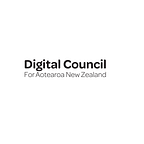Towards trustworthy and trusted automated decision-making in Aotearoa #Weeknotes 34
Kia ora koutou — we are the Digital Council for Aotearoa New Zealand. We are looking forward to sharing our mahi (work) here with you. In keeping with the #weeknotes approach, we want to be transparent about our work. We are looking for input from people from all walks of life to inform our advice to the New Zealand Government. We want to contribute to an Aotearoa where technology is used in ways that grow trust, embrace innovation and embed equity.
This week we reached another milestone for our first year. We delivered our report Towards Trustworthy and Trusted Automated Decision-Making in Aotearoa to the Minister for Digital Economy and Communications and the Minister of Statistics, the Hon Dr David Clark.
Our report is the culmination of many months of hard work by many dedicated experts. This included a literature review, commissioning a report from Te Kotahi Institute on Māori perspectives of trust in automated decision-making, and interviews with experts in New Zealand and abroad. We also held participatory design workshops with over 180 members of communities whose voices are central to the findings and recommendations of the report.
We are pleased that the Minister’s portfolios are well positioned to connect the dots across government and that the Minister has a background in inclusion. As our workshop findings highlight, technology can’t be separated from the wider system.
Key themes from our research into trust in automated decision-making (ADM)
When it comes to what makes people feel more comfortable about automated decision making, our research includes some clear themes.
- The technology can’t be separated from the wider systems in which it operates. People’s experiences and views of an organisation and people influence whether they trust any automated decisions carried out by that organisation.
- Participants thought that ADM, with its ability to process data fast and at scale, is well suited to some situations.
- However, they also see disadvantages and potential harms. They are worried about the potential to embed bias and automate discrimination with ADM — especially with decisions that have a high impact on people’s lives.
What would make people trust ADM more and make it worthy of their trust
People provided clear suggestions about what would make them feel more comfortable in situations where ADM is used.
- Systems that are built to meet the needs and reflect the values of the communities impacted. This means that people who have similar lived experience to them are involved in developing decision-making systems and the interventions that result from them.
- Transparency and clear communication about how the government uses ADM is required.
We see clear action needed around giving effect to Te Tiriti; decentralising decision-making and giving communities more agency over data collection; greater cohesion, clarity and guidance around automated decision-making for both public and private sectors; and building a more diverse digital workforce. We’ve provided detailed recommendations around how we think these things can be achieved.
Next steps
The Minister is considering these recommendations. We will work with him in the new year to determine a date for releasing our full report to the public. We will work with the government to ensure that our recommendations, and the actions grown out of our research and engagement with communities, are understood and implemented.
Thank you
We thank those who carried out research on our behalf, wisely advised us, and who collectively partnered with us. We thank the workshop participants who shared their concerns, hopes and aspirations with us. Thank you for your openness, frankness, honesty and passion. It is your voices that energise us to work towards a future where digital and data-driven technologies are designed and used with ambition and care for both individual and collective good. Where digital and data-driven technologies are used in ways that give effect to Te Tiriti o Waitangi, grow trust, embrace innovation, and increase equity.
We look forward next year to joining our voices in calling for changes that foster the trust and trustworthiness in automated decision-making that you wish to see.
About our work: Council members come together monthly to make key decisions and progress our work programme. Between formal meetings, members focus on various work streams. Colin Gavaghan and Marianne Elliott lead our research work. Kendall Flutey and Roger Dennis lead our ad-hoc work. Rachel Kelly and Nikora Ngaropo lead our communications. Our Chair, Mitchell Pham, holds responsibility for stakeholder engagement.
